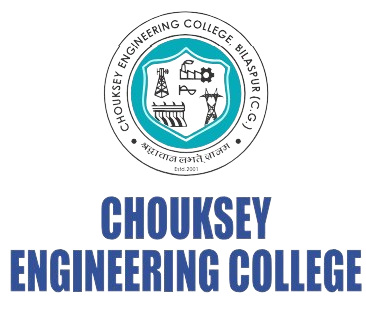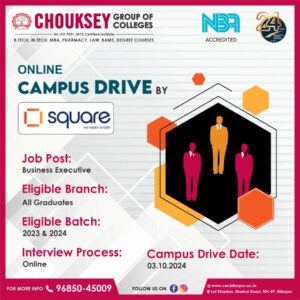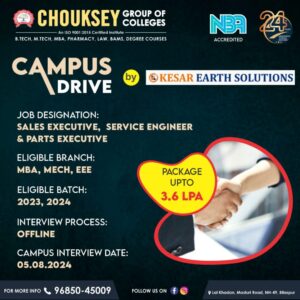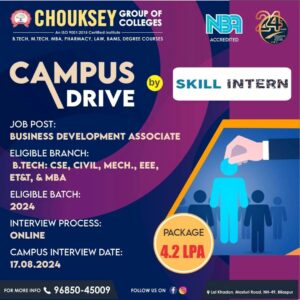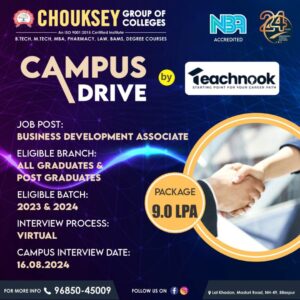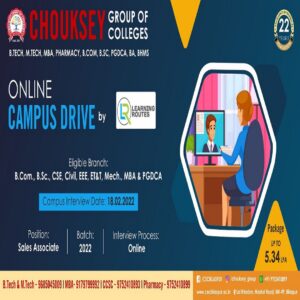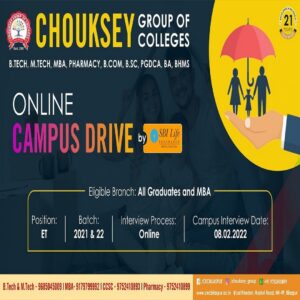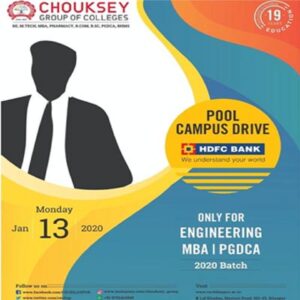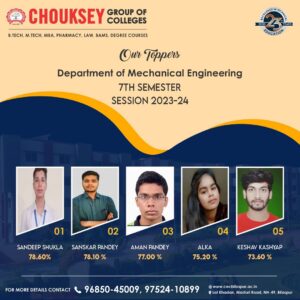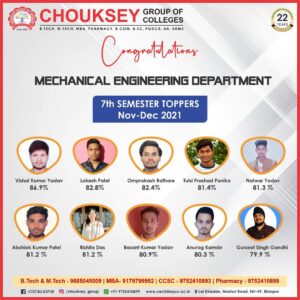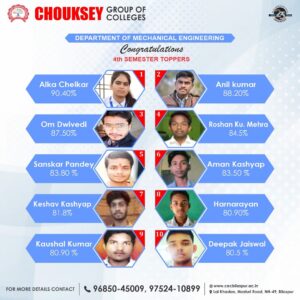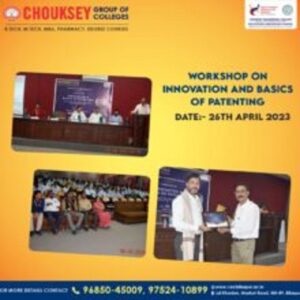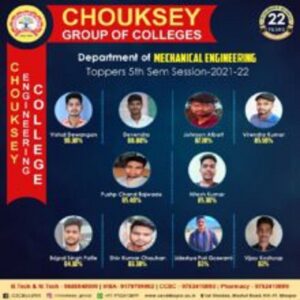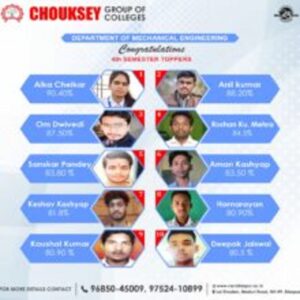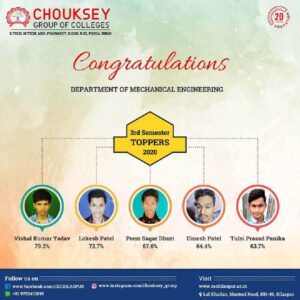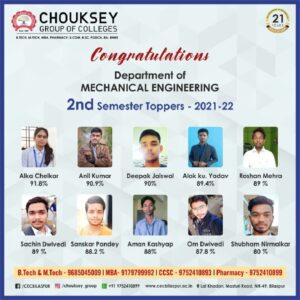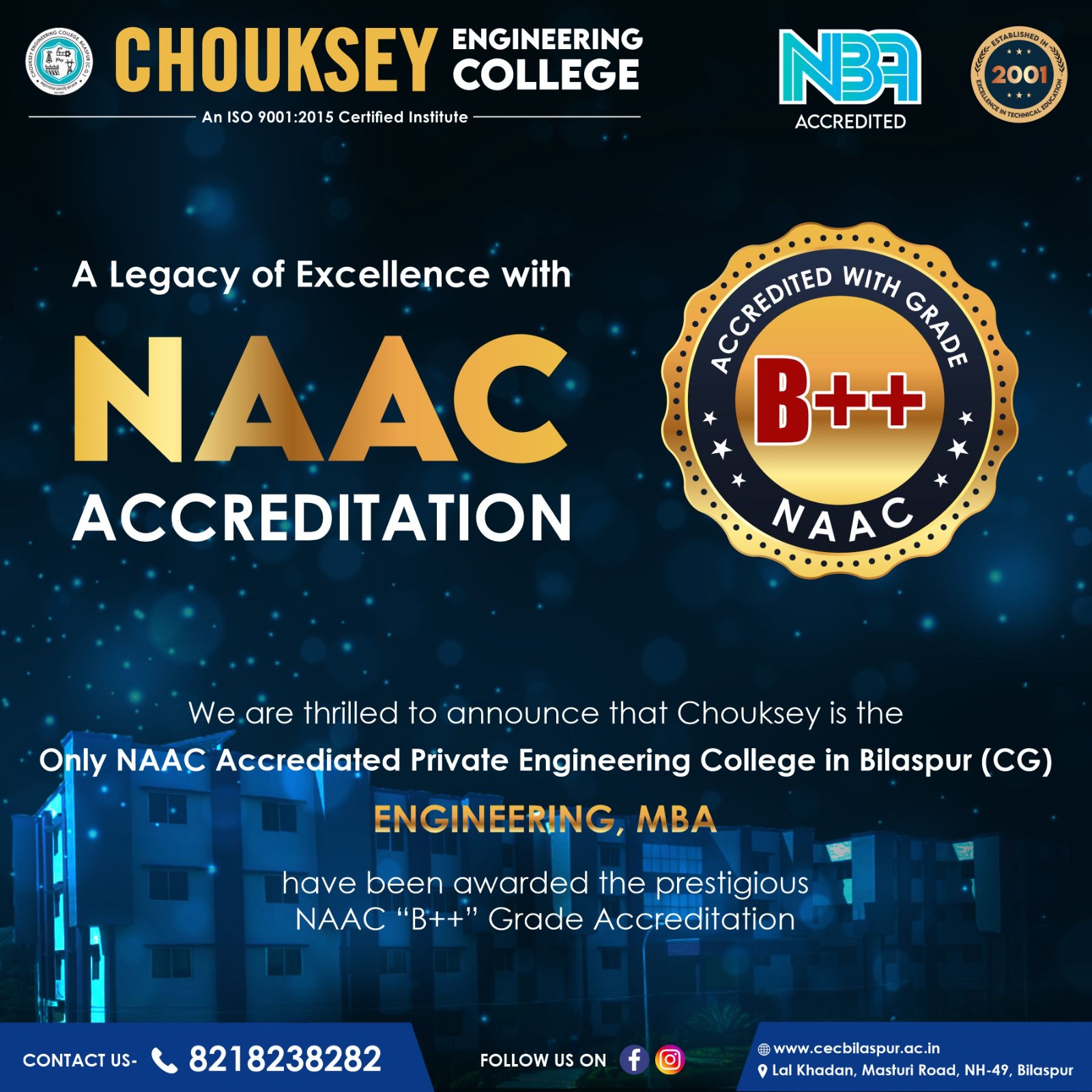The department of Mechanical Engineering was established in the year 2002. Our mission is to create a research hub engaged in contemporary research in association with industries and other reputed institute. Department of Mechanical Engineering is one of the prime departments of our college and offers a 4 year B.Tech programme in Mechanical Engineering. The department also runs Post Graduate Courses in Production Engineering The department of Mechanical Engineering has a dynamic team of faculty and supporting staff members.
The department is vibrant and organizes several activities round the year. Its strong and interactive curriculum and hands on learning has the capability of taking the students career to the next level, whether it be in the professional engineering practice or in advanced study. The department, right from its inception has been focusing on quality teaching along with integrated laboratory experience.
Department of Mechanical Engineering is continuously striving to achieve excellence in academic and industry-oriented research along with work offering service to the society. We aim to provide our students a perfect blend of intellectual and practical exposure that helps them to serve our society and address a variety of needs of the society.
On completion of the degree, our students are prepared for entry-level work as a Mechanical Engineer in Industry as well as for higher education where a fundamental Engineering background constitutes a desirable foundation. Academic course work and project works offered at the end of the course are designed to endow students with the ability to apply knowledge of Science, Mathematics, and Engineering, and the capability to work effectively in multidisciplinary teams, providing leadership and to utilize technical expertise.
TEACHING PEDAGOGY
Creating adaptable learning environment
As per the swift Technical expansion and the new learning solutions are available and it enables more information and communications technology a focal point of learning environment for the students. Department of Computer Science & Engineering is determined to provide an adaptable learning to the students
Learning through manifold channels
We focus in the planning of versatile studying and working methods which revolves around the learner. The learning environment is built taking into account the needs of various learners, enabling the use of manifold channels in learning situations like Problem and project based learning Channel, Industrial interactive channel, on-hand training channel and so on.
Learning through visual and audio environment
The illustration atmosphere greatly influences the awareness of visual stimuli as well as the learning outcomes and learning attitudes of the students. Every method and approaches is practiced through the use of audio and visual learning pedagogy, which benefit the students in one or the other way.
Teaching through assessment and peer review
Assessment play vital role in analyzing the outcome of the teaching learning process. This is accomplished by regular class test, assignments and tutorials. A peer review is than presented to students for their presentation and projection.
Interactive methods and program level strategies
Interactive methods are adopted through which simulation model of various virtual prototype is developed, which play important step for enhancing the knowledge of students. Small group teaching is also practiced for bringing out the best. A program level strategy mainly focuses on the various emerging research and entrepreneurship areas of Computer Science & Engineering in the undergraduate level.
Improves Teacher-Student Communication
Teacher and student communication is one of the primary things to be focused on. To make it effective, study what your students’ likes and dislikes are and how they change over the period of time. Encourage them to speak their minds and not to be afraid of the mistakes they make.
Encourage Cooperative Learning Environment
Students work in groups of two or more to perform a given task or to achieve a specific goal. They learn to explore and apply key ideas in their daily lives from their lessons. Working together promotes dialogue, which is the key to learning. Dialogue enhances understanding when learners interact with each other and share ideas and knowledge.
Sr. | Faculty Name | Designation | Qualification | Department |
1 | Dr. Shailesh Kumar Dewangan | Associate Prof. | Ph.D. | Mechanical Engineering |
2 | Dr. Joji Thomas | Associate Prof. | Ph.D. | Mechanical Engineering |
3 | Dr. Sharda Pratap Shrivas | Asst. Prof. | Ph.D. | Mechanical Engineering |
4 | Mr. Chitrakant Tiger | Asst. Prof. | M.Tech. | Mechanical Engineering |
5 | Mr. Sanjay Vaidya | Asst. Prof. | M.Tech. | Mechanical Engineering |
6 | Mr. Nitin Nayak | Asst. Prof. | M.Tech. | Mechanical Engineering |
7 | Mr. Amit Kumar Vishvakarma | Asst. Prof. | M.Tech. | Mechanical Engineering |
8 | Mr. Jaykishan Gupta | Asst. Prof. | M.Tech. | Mechanical Engineering |
9 | Mr. Anand Shriwas | Asst. Prof. | M.Tech. | Mechanical Engineering |
10 | Mrs. Richa Pahwa | Asst. Prof. | M.Tech. | Mechanical Engineering |
11 | Mr.Neeraj Chandra | Asst. Prof. | M.Tech. | Mechanical Engineering |
12 | Mr. Shubham Mishra | Asst. Prof. | M.Tech. | Mechanical Engineering |
13 | Mr. Naveen Sahu | Asst. Prof. | M.Tech. | Mechanical Engineering |
14 | Mr. Mayank Dewangan | Asst. Prof. | M.Tech. | Mechanical Engineering |
| Sn | Name | ExamYear | Session | Company |
| 1 | SANDEEP SHUKLA | Apr-May 2024 | 2023-24 | Automotive Manufacturers Pvt. Ltd. |
| 2 | SUKHSAGAR NIRMALKAR | Apr-May 2024 | 2023-24 | Automotive Manufacturers Pvt. Ltd. |
| 3 | SHIVAM PANDEY | Apr-May 2024 | 2023-24 | Automotive Manufacturers Pvt. Ltd. |
| 4 | K ASHISH | Apr-May 2024 | 2023-24 | Automotive Manufacturers Pvt. Ltd. |
| 5 | KRISHNA KUMAR | Apr-May 2024 | 2023-24 | Automotive Manufacturers Pvt. Ltd. |
| 6 | AYUSH SINGH RATHORE | Apr-May 2024 | 2023-24 | Automotive Manufacturers Pvt. Ltd. |
| 7 | MAHESH YADAV | Apr-May 2024 | 2023-24 | Champion Ceramics Pvt. Ltd. |
| 8 | ALOK KUMAR YADAV | Apr-May 2024 | 2023-24 | Champion Ceramics Pvt. Ltd. |
| 9 | ASHISH KUMAR SHUKLA | Apr-May 2024 | 2023-24 | Champion Ceramics Pvt. Ltd. |
| 10 | ANIL KUMAR | Apr-May 2024 | 2023-24 | Chegg India |
| 11 | ROSHAN KUMAR | Apr-May 2024 | 2023-24 | Chegg India |
| 12 | HARNARAYAN | Apr-May 2024 | 2023-24 | Escorts Kubota Ltd |
| 13 | SHUBHAM | Apr-May 2024 | 2023-24 | Escorts Kubota Ltd |
| 14 | AMAN KASHYAP | Apr-May 2024 | 2023-24 | Fusion Microfinance Ltd. |
| 15 | SACHIN KUMAR DWIVEDI | Apr-May 2024 | 2023-24 | Fusion Microfinance Ltd. |
| 16 | TULARAM SAHU | Apr-May 2024 | 2023-24 | Fusion Microfinance Ltd. |
| 17 | SHASHANK KUMAR LAHRE | Apr-May 2024 | 2023-24 | Fusion Microfinance Ltd. |
| 18 | KAILASH | Apr-May 2024 | 2023-24 | Fusion Microfinance Ltd. |
| 19 | DEEPAK JAISWAL | Apr-May 2024 | 2023-24 | JMS Mining |
| 20 | VIKRANT PANDAY | Apr-May 2024 | 2023-24 | JMS Mining |
| 21 | SANSKAR | Apr-May 2024 | 2023-24 | Kesar Earth Solutions |
| 22 | PRADEEP DHIWAR | Apr-May 2024 | 2023-24 | Kesar Earth Solutions |
| 23 | PREETI RATNAKAR | Apr-May 2024 | 2023-24 | Kesar Earth Solutions |
| 24 | RAHUL KAUSHIK | Apr-May 2024 | 2023-24 | Leak-Proof Engineering |
| 25 | HEMANT KUMAR SIDAR | Apr-May 2024 | 2023-24 | Shriram Finance |
| 26 | OM DWIVEDI | Apr-May 2024 | 2023-24 | Shriram Finance |
| 27 | ALKA | Apr-May 2024 | 2023-24 | Skill Intern |
| 28 | GOVIND | Apr-May 2024 | 2023-24 | Skill Intern |
| 29 | KAUSHAL KUMAR | Apr-May 2024 | 2023-24 | Skill Intern |
| 30 | KESHAV KASHYAP | Apr-May 2024 | 2023-24 | Skill Intern |
| 31 | PUSHPCHAND RAJWADE | Apr-May 2023 | 2022-23 | Trainee at EICHER Pvt. Ltd. |
| 32 | SHIV KUMAR CHUHAN | Apr-May 2023 | 2022-23 | Trainee at EICHER Pvt. Ltd. |
| 33 | BRIJPAL SINGH PATLE | Apr-May 2023 | 2022-23 | Trainee at EICHER Pvt. Ltd. |
| 34 | ABHAY KUMAR KASHYAP | Apr-May 2023 | 2022-23 | Trainee at EICHER Pvt. Ltd. |
| 35 | KSHITIJ PRASHAD KHAIRWAR | Apr-May 2024 | 2022-23 | Abhishank Technology Private Ltd. |
| 36 | OMPRAKASH RATHORE | Apr-May 2024 | 2022-23 | Just Dial Campus Drive Section |
| 37 | AMAL K BENSON | Apr-May 2020 | 2020-21 | LG Electronics Campus Drive |
| 38 | L. LOKESH NAIDU | Apr-May 2020 | 2020-21 | LG Electronics Campus Drive |
| 39 | SWETA DAHARIYA | Apr-May 2020 | 2020-21 | LG Electronics Campus Drive |
| 40 | KAPIL GUPTA | Apr-May 2020 | 2020-21 | LG Electronics Campus Drive |
| 41 | MAHESH KUMAR KAUSHIK | Apr-May 2020 | 2020-21 | LG Electronics Campus Drive |
| 42 | AADESH VERMA | Apr-May 2020 | 2020-21 | LG Electronics Campus Drive |
| 43 | P. ASHISH KUMAR | Apr-May 2020 | 2020-21 | LG Electronics Campus Drive |
| 44 | ABHI KESHARWANI | Apr-May 2020 | 2020-21 | LG Electronics Campus Drive |
| 45 | HARSHIT DWIVEDI | Apr-May 2020 | 2020-21 | LG Electronics Campus Drive |
| 46 | ARUNABH AWASTHI | Apr-May 2020 | 2020-21 | LG Electronics Campus Drive |
| 47 | DUNDU BHARGAV | Apr-May 2020 | 2020-21 | LG Electronics Campus Drive |
| 48 | ABHASH SHRIVASH | Apr-May 2020 | 2020-21 | ICICI Prudential Life Insurance |
| 49 | AMAL K BENSON | Apr-May 2020 | 2020-21 | ICICI Prudential Life Insurance |
| 50 | ANKIT VERMA | Apr-May 2020 | 2020-21 | ICICI Prudential Life Insurance |
| 51 | AMAL K BENSON | Apr-May 2020 | 2020-21 | HDFC Bank Ltd |
| 52 | VIJAY KUMAR SHARMA | Apr-May 2019 | 2019-20 | Godrej & Boyce |
| 53 | ABHISHEK KURREY | Apr-May 2019 | 2019-20 | Grifeo |
| 54 | ASHHARALAM KHAN | Apr-May 2019 | 2019-20 | Grifeo |
| 55 | DIGESH KUMAR | Apr-May 2019 | 2019-20 | Grifeo |
| 56 | PRAMISH MISHRA | Apr-May 2019 | 2019-20 | Grifeo |
| 57 | ROHIT KUMAR CHANDRAKAR | Apr-May 2019 | 2019-20 | Grifeo |
| 58 | SAHIL BILUNG | Apr-May 2019 | 2019-20 | Grifeo |
| 59 | SAURABH DIWAN | Apr-May 2019 | 2019-20 | Grifeo |
| 60 | VIVEK KAUSHIK | Apr-May 2019 | 2019-20 | Grifeo |
| 61 | VISHWAJEET SHENDE | Apr-May 2019 | 2019-20 | Triant Software Solutions |
| 62 | UJJWAL SUTRADHAR | Apr-May 2019 | 2019-20 | Amazon |
| 63 | NEERAJ KUMAR SINGH | Apr-May 2019 | 2019-20 | Amazon |
| 64 | KUNAL BHASKAR | Apr-May 2019 | 2019-20 | Tech Mahindra |
| 65 | AMRITANSH MEHRA | Apr-May 2019 | 2019-20 | Tech Mahindra |
| 66 | SHUBHAM PANDEY | Apr-May 2019 | 2019-20 | Tech Mahindra |
| 67 | AJAY KUMAR | Apr-May 2019 | 2019-20 | Tech Mahindra |
| 68 | ABHISHEK KURREY | Apr-May 2019 | 2019-20 | Tech Mahindra |
| 69 | SURENDRA DEWANGAN | Apr-May 2019 | 2019-20 | Tech Mahindra |
| 70 | PUSHPENDRA KUMAR PATEL | Apr-May 2019 | 2019-20 | Tech Mahindra |
| 71 | OM NAGENDRA PANDEY | Apr-May 2019 | 2019-20 | Tech Mahindra |
| 72 | ROHIT KUMAR CHANDRAKAR | Apr-May 2019 | 2019-20 | Tech Mahindra |
| 73 | K. PARMESHWAR RAO | Apr-May 2019 | 2019-20 | Tech Mahindra |
| 74 | UJJWAL SUTRADHAR | Apr-May 2019 | 2019-20 | ICICI Prudential Life Insurance |
| SN | Type of activity | Title of the event | Year | Duration (in days) |
| 1 | One day Workshop | Topic- Innovation & Basics of Patenting Guest lecture | 2023 | 1 day |
| 2 | Industrial Visit | Industrial Visit toCentral Institute of Petrochemicals Engineering, Raipur | 2023 | 1 day |
| 3 | Industrial Visit | Industrial Visit to TATA Motor Sendari | 2022 | 1 day |
| 4 | Industrial Visit cum Workshop | Industrial Visit to Central Institute of Plastic Engineering Technology Raipur & 3D Printing Workshop | 2022 | 1 day |
| 5 | Guest Lectures | “Green Manufacturing strategy & Sustainable Manufacturing” | 2022 | 1 day |
| 6 | Workshop | Online Quiz on Mechanical 1.0 “Welding Science &Technology | 2020 | 1 day |
| 7 | Workshop | Online Technical Quiz on Mechanical 2.0 “Mechanics of Solid” | 2020 | 1 day |
| 8 | Workshop | Development & implement as Research Methodology- II” | 2020 | 2 days |
| 9 | Crash Course | Gate Classes Under TEQIP Phase- III | 2020 | 21 days |
| 10 | Industrial Visit | B.E 7thSem Students Visited Madwa Power Plant, Champaof CSPDCL | 2019 | 1day |
| 11 | Industrial Visit | B.E. 7th Sem Students Visited Indo Danish Tool Room, Jamshedpur | 2019 | 1day |
| 12 | Workshop | Workshop on “Scope for Mechanical Engineers in CIPET” by Mr. Sunil. JANA (CIPET RAIPUR) | 2018 | 1 day |
Intake and Eligibility
| Course | Eligibility | Seats | Duration |
| B.Tech in Mechanical Engineering | 12th marks For Gen -45% (PCM) For category -40% (PCM) | 60 | 4 Years |
| M.Tech in Production Engineering | BE/B.Tech with 50% | 18 | 2 Years |
Our Vision | Mission
DEPARTMENT VISION
To educate and prepare students to excel as professionals ready with leadership roles in the field of mechanical engineering to meet the ever-changing Industrial demands of the world.
DEPARTMENT MISSION
- M1 : To impart Mechanical Engineering knowledge through trained faculty in conducive environment.
- M2 : To produce motivated and competent engineers capable of solving current problems and envisaging and developing new technologies beneficial to society.
- M3 : To provide students with an academically excellent environment that fosters leadership, ethical principles, and a commitment to lifelong learning.
- M4 : To prepare entrepreneurs and employable engineers.
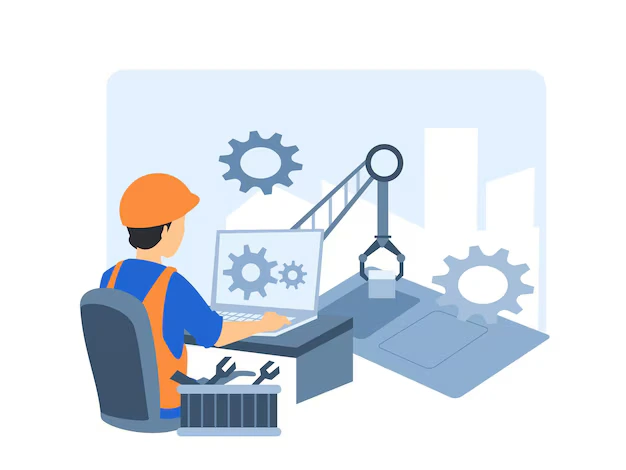
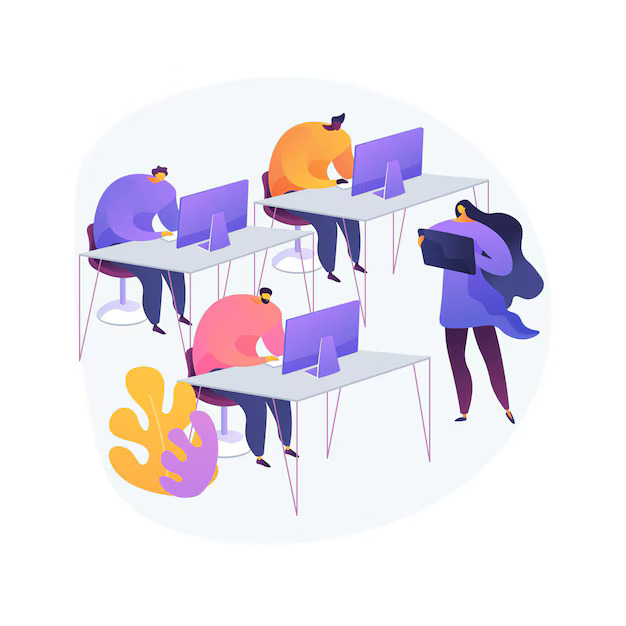
Program Educational Objectives (PEOS)
- To prepare Mechanical Engineers who are skillful, competent and knowledgeable.
- To make our Engineers understand Engineering System components with the sense of professionalism and ethics for the benefit of industry and society.
- To make the engineers educated and trained enough to make contribution in manufacturing and allied industries.
- To encourage Engineers to develop an alternative career as an entrepreneur providing job opportunities.
PROGRAM SPECIFIC OUTCOMES (PSO’s)
- After completion of program student should be able:
- To create designs for mechanical systems, both in terms of product and process development.
- To analyze the movement of mass and energy within thermal systems.
- To choose appropriate manufacturing methods that align with industrial needs and standards
PROGRAM OUTCOMES (POs)
Engineering Graduates will be able to:
- Engineering knowledge: Apply the knowledge of mathematics, science, engineering fundamentals, and an engineering specialization to the solution of complex engineering
- Problem analysis: Identify, formulate, review research literature, and analyze complex engineering problems reaching substantiated conclusions using first principles of mathematics, natural sciences, and engineering
- Design/development of solutions: Design solutions for complex engineering problems and design system components or processes that meet the specified needs with appropriate consideration for the public health and safety, and the cultural, societal, and environmental considerations.
- Conduct investigations of complex problems: Use research-based knowledge and research methods including design of experiments, analysis and interpretation of data, and synthesis of the information to provide valid
- Modern tool usage: Create, select, and apply appropriate techniques, resources, and modern engineering and IT tools including prediction and modeling to complex engineering activities with an understanding of the
- The engineer and society: Apply reasoning informed by the contextual knowledge to assess societal, health, safety, legal and cultural issues and the consequent responsibilities relevant to the professional engineering
- Environment and sustainability: Understand the impact of the professional engineering solutions in societal and environmental contexts, and demonstrate the knowledge of, and need for sustainable
- Ethics: Apply ethical principles and commit to professional ethics and responsibilities and norms of the engineering
- Individual and team work: Function effectively as an individual, and as a member or leader in diverse teams, and in multidisciplinary
- Communication: Communicate effectively on complex engineering activities with the engineering community and with society at large, such as, being able to comprehend and write effective reports and design documentation, make effective presentations, and give and receive clear
- Project management and finance: Demonstrate knowledge and understanding of the engineering and management principles and apply these to one‟s own work, as a member and leader in a team, to manage projects and in multidisciplinary
- Life-long learning: Recognize the need for, and have the preparation and ability to engage in independent and life-long learning in the broadest context of technological
PROGRAM SPECIFIC OUTCOMES (PSOs)
- PSO1: Ability to understand the principles and working of computer systems to assess the hardware and software aspects of computer systems.
- PSO2: Apply standard Software Engineering practices and strategies in real-time software project development using open-source programming environment or commercial environment to meet the specified requirements.
- PSO3: Design and develop computer programs/ computer-based systems and use the knowledge and skills in various domains to identify research gaps and hence to provide solution to new ideas and innovations.
